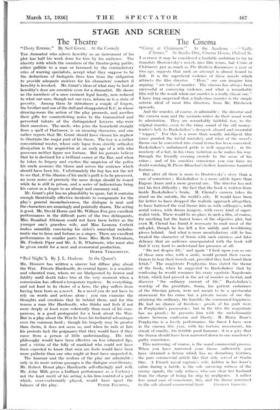STAGE AND SCREEN
"Dusty Ermine." By Neil Grant. At the Comedy THE dramatist who selects heredity as an instrument of his plot has half his work done for him by his audience, The alacrity with which the members of the theatre-going public, either gullible to a man or bemused by the contradictory cries of warring specialists, accept what they suppose to be the deductions of biologists frees him from the obligation to provide adequate motives for his characters' conduct if heredity is invoked. Mr. Grant's ideas of what may be laid at heredity's door are eccentric even for a dramatist. lie shows us the members of a once eminent legal family, now reduced to what our ears, though not our eyes, inform us is a state of poverty. Among them he introduces a couple of forgers, the brother and son of the dull and disappointed K.C. in whose drawing-room the action of the play proceeds, and ascribes their gifts for counterfeiting notes to the transmitted and perverted talents of the distinguished lawyers who were their ancestors. The uncle, who joins the household straight from a spell of Dartmoor, is an amusing character, and one rather regrets that Mr. Grant should have chosen his nephew to illustrate the major part of his thesis. The boy is a rather conventional waster, whose only lapse from strictly orthodox dissipation is the acquisition at an early age of a wife who possesses neither figure nor fortune. But his parents believe that he is destined for a brilliant career at the Bar, and when he takes to forgery and excites the suspicion of the police his uncle assumes the blame and serves the sentence which should have been his. Unfortunately the boy has not the wit to see that, if the illusion of his uncle's guilt is to be preserved, no more notes of precisely the same design should be issued while he is still in prison, and a series of indiscretions bring his career as a forger to an abrupt and summary end.
Mr. Grant's plot has no plausibility to spare, but it contains enough theatrically effective incidents to compensate for the play's general inconclusiveness, the dialogue is neat and the characters are amusingly and pointedly drawn. The acting is good. Mr. David Home and Mr. William Fox give excellent performances in the difficult parts of the two delinquents, Miss Rosalind Atkinson could not have been better as the younger one's graceless wife, and Miss Leonora Corbett makes smoothly convincing his sister's somewhat melodra- matic rise to fame and fortune as a singer. There are excellent performances in smaller parts from Miss Merle Tottenham, Mr. Frederic Piper and Mr. A. It. Whatmore, who must also be given credit for a neat and economical production.
DEREK VEUSCIIOYLE.














































 Previous page
Previous page